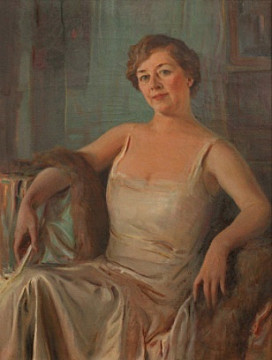Beatrice (Warren) Rees-Mogg (1892-1978)
Mrs Beatrice (Warren) Rees-Mogg, formerly the Actress "Beatrice Warren"
She was born at Mamaroneck on Long Island, New York. Both her parents were born in the States, but all four of her grandparents emigrated in poverty from Ireland. After graduating from the private Catholic College of New Rochelle she set her sights on a career on the stage and taught elocution at the High School of New York. Her first role on stage came in 1915 with Margaret Anglin ("one of the most brilliant actresses of her day") in a series of Greek plays staged in California. She went onto play a number of leading Shakespearean roles, particularly in the comedies, including a wartime tour of Canada with Margaret Anglin. She took the second lead in Somerset Maugham's "Caroline" on its Chicago opening and worked with other stars such as Laurette Taylor and on Broadway with Sarah Bernhardt in one of her last American tours.
In 1920, she came to England to join the Old Vic Company but within a matter of months met and married a minor English landowner E. Fletcher Rees-Mogg. They were married November 20, 1920, by a Catholic Priest in the Drawing Room of her parents' new mansion (built four years previously) on Alda Road in Shore Acres at Mamaroneck. A few days before the wedding she voted for the Democrats (when FDR was the vice-presidential candidate) in the first presidential election in which American women had the vote. They honeymooned in America before settling in England at Cholwell House in Somerset. Beatrice gave up the stage and did not return to the States until after World War Two.
Between the wars she joined the Somerset Red Cross, serving as Vice-President and regional representative on the National Executive Committee. During World War II when Bristol was being heavily bombed she helped to evacuate the vulnerable to North Somerset and much later in 1956 received recognition for her work in helping to receive Hungarian refugees. After the war, she and the Duchess of Marlborough (another American) felt there were too many elderly and ineffective county presidents on the Red Cross. Lord Woolton invited them to present a report which was gratefully received but roundly ignored. She also shared her husband's interest in local government and sat as the member for Hinton Blewitt on the Clutton Rural District Council until the early 1970s.
Her obituary in The Times (of which her son Lord Rees-Mogg was editor) said "she retained all her life a vivid memory of childhood in late nineteenth-century America, which had also given her an unobtrusive but strong Roman Catholic faith". She is the paternal grandmother of the British Brexiteer, Jacob Rees-Mogg, M.P. She was survived by a son and two daughters who were brought up by her in her Roman Catholic faith.
In 1920, she came to England to join the Old Vic Company but within a matter of months met and married a minor English landowner E. Fletcher Rees-Mogg. They were married November 20, 1920, by a Catholic Priest in the Drawing Room of her parents' new mansion (built four years previously) on Alda Road in Shore Acres at Mamaroneck. A few days before the wedding she voted for the Democrats (when FDR was the vice-presidential candidate) in the first presidential election in which American women had the vote. They honeymooned in America before settling in England at Cholwell House in Somerset. Beatrice gave up the stage and did not return to the States until after World War Two.
Between the wars she joined the Somerset Red Cross, serving as Vice-President and regional representative on the National Executive Committee. During World War II when Bristol was being heavily bombed she helped to evacuate the vulnerable to North Somerset and much later in 1956 received recognition for her work in helping to receive Hungarian refugees. After the war, she and the Duchess of Marlborough (another American) felt there were too many elderly and ineffective county presidents on the Red Cross. Lord Woolton invited them to present a report which was gratefully received but roundly ignored. She also shared her husband's interest in local government and sat as the member for Hinton Blewitt on the Clutton Rural District Council until the early 1970s.
Her obituary in The Times (of which her son Lord Rees-Mogg was editor) said "she retained all her life a vivid memory of childhood in late nineteenth-century America, which had also given her an unobtrusive but strong Roman Catholic faith". She is the paternal grandmother of the British Brexiteer, Jacob Rees-Mogg, M.P. She was survived by a son and two daughters who were brought up by her in her Roman Catholic faith.






